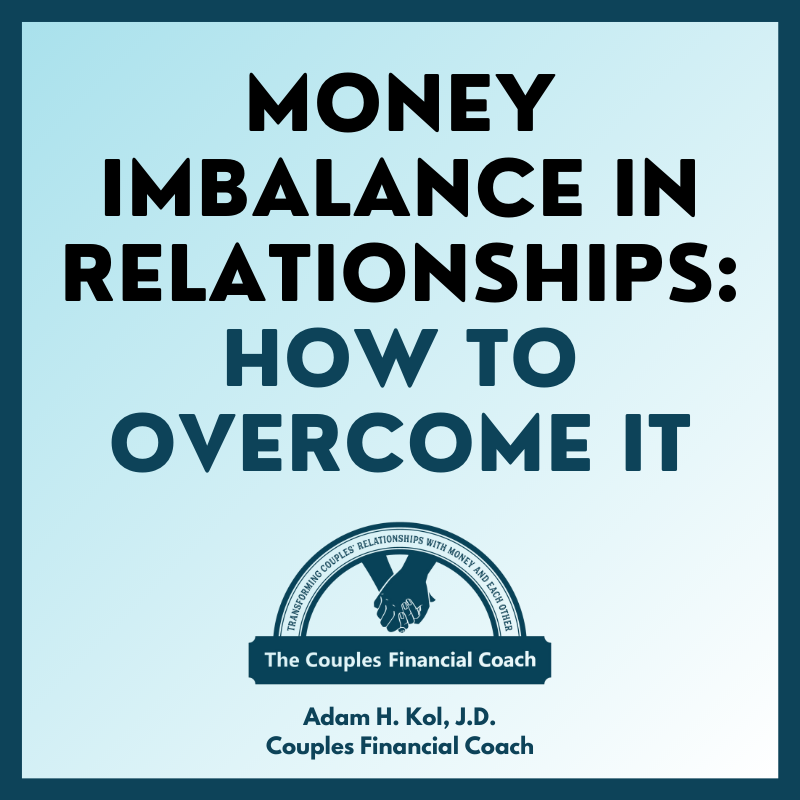8 Steps to Transforming Your Relationship With Money
Achieving financial independence and prosperity and transforming your relationship with money can be life-changing for your and your significant other. You can make your hard-earned cash work for you rather than the other way around, but it all starts with your money mindset.
If you have a bad relationship with money or are constantly jealous of how your couple friends deal with their money, yet you can't seem to change your ways, keep reading to see what you can do to improve your relationship with money.
What Is a Bad Relationship With Money?
You may wonder, what's a bad relationship with money, and how does it happen? It doesn’t happen overnight, nor is it just attributed to poor spending habits or not saving money. Plus, a bad money relationship also looks different for each person — it’s about recognizing the part of your relationship with money that get you off track from your family financial goals, rather than those parts that help you with achieving your financial goals as a couple.
For most people, though, it boils down to control: feeling like money controls you is not a great experience. When personal money management within your relationship feels impossible for you two and eventually causes stress, anxiety, and maybe even affects your physical health, then it’s clear that your money mindset and finances are not working for you.
But when you can control your money —as in you have a plan, you’re being intentional, and your money management is giving you peace of mind and improving your life — then you’re on the right track!
By the way: if you have a negative association with the word “bad,” feeling like money mistakes make you a bad person or partner, then swap “bad” with unhelpful, sub-optimal, not-ideal, or anything similar.
Money Relationship Mistakes
Money relationship mistakes aren't just about bad habits but also how you think about money and talk about money with your spouse.
Sure, you could say “I'm going to stop spending money excessively,” or “I'm going to start making more money,” but that doesn't change your relationship with money. It may change your habits for the time being, but if you're like most people, old habits die hard and it’s hard to get new ones to stick.
Rather than focusing on changing your perceived bad money habits to change your relationship with money, it's time to work on changing your mindset to achieve the financial freedom you and your family desire.
Related Article: What’s the #1 Money Mistake Couples Make?
How to Start Transforming Your Relationship With Money Today
Transforming your relationship with money may feel overwhelming or even impossible right now. You may think that your finances seem like they can't be changed, or that investing isn't for you, in which case to keep doing things the way you already are is the path of least resistance.
But where is this getting you? Be honest with yourself. If it hasn’t worked out so far, new actions and approaches are usually going to be the best pathway to new results.
If you're ready, then let’s dig into how you can change your mindset from one of scarcity and close-mindedness to one with a greater sense financial abundance and possibilities.
1. Work With a Financial Coach
To change your relationship with money, it helps to have someone else's opinion or input. A financial coach can help you and your husband or wife sense what is causing your bad relationship with money, whether individually or as a couple.
You may have thoughts and feelings you don't even realize are affecting your money mindset and financial integrity. It is important to talk to someone who “gets it” and therefore can help you see where you need to change to meet your future financial goals.
Are you ready to have healthy conversations about money? Schedule a free consultation with me!
2. Consider Your Thoughts and Past Choices Around Money
When reflecting on past money mistakes, it’s common and maybe even natural to berate yourself, upset about your actions (or inaction). But in reality, but what good does that do?
Instead, what if you said: “How can I learn from my money mistakes?”
You can actually turn those issues around into something good - something that can push you forward and help you make better personal finance decisions together and individually.
It may be difficult or uncomfortable to look back at your mistakes, but this a great chance to be financial teammates with your significant other. Listen to and support each other in these reflections, and you’ll improve your relationship with both money and each other! And when learn what not to do, that can make achieving financial independence a lot easier.
3. Change Your Money Mindset By Starting With Awareness
Stop and ask yourself what you think about money.
For example, do you tell yourself “I'm not good at saving money,” or “I can't manage money”? You may have to quiet your mind in order to hear these narratives, which can be subconscious. But this is key, as these underlying narrative often drive our actions.
So if your mind tells you that you have an unhealthy relationship with money, then you’ll likely take actions that (a) you think someone with an unhealthy relationship with money would take, and/or (b) confirm that unhealthy in your mind.
Awareness is the first step to growth and change, so don’t skip it!
By the way, it makes sense that you might have a negative outlook on money if you haven't managed it well in the past. But changing that mindset will create mental space and energy that will help you learn the skills necessary to not only have enough money but also to achieve financial independence.
Related Podcast Episode: Money Mindset Makeover, with special guest Danielle Davis
4. Set Realistic Money Goals
We could all say “I want to be a millionaire,” but how realistic is it?
If you don’t achieve your financial goals, this can be unsettling. So choosing unrealistic goals can lead to poor money decisions and a bad relationship with money.
Instead, start by setting goals you know you can achieve.
I'm not saying that big goals are bad, but while you’re getting your footing, it can be beneficial to set small, attainable goals instead. Small wins are great for boosting your confidence, and that confidence will then improve money mindset and relationship with money.
When you achieve those goals, don't be afraid to level up and even push yourself. But for the time being, creating realistic goals to save, invest, and get your family back on track is key.
5. Be Intentional
Have a purpose for your spending; don't just spend to spend. Seems simple enough, right? But most of us know how challenging that can be in reality. So how do you start to be intentional?
Look at your credit card and bank statements, and ask yourself how you feel about your spending. I recommend looking at at least the last two months worth of statements, line by line.
How does that exercise make you feel? Where did you overspend on things you didn't intend to purchase?
Ask yourself if you have the money in your bank account that you expected at the end of the month, and if not, why not? Perhaps you overspent or didn’t stick to your budget, so you didn’t put your money where you intended to, i.e. a savings account or some sort of investment.
As discussed in #2 above, don't beat yourself up if you didn't do as you intended. Instead, objectively note how those actions affected your financial goals and how you feel about yourself, and then use those thoughts moving into the next month to make better money decisions!
6. Make Time for Thoughts of Appreciation and Abundance
Everyday life can get overwhelming, never having enough time to accomplish all of our goals, including around our relationship with money. But if you're intentional in taking time to feel appreciative and abundant, transforming your relationship with money will be a lot easier.
Set aside a few minutes each day to appreciate what you do have and to think abundant thoughts, like “I have enough money,” “Making money is easy for me,” or “Money is always available.” Take note of how this affects your thoughts around money over time.
If those thoughts feel uncomfortable and inauthentic, here are two approaches:
(1) Keep trying in earnest for a while, and see if anything shifts. Or,
(2) Start with neutral and/or objective thoughts like “I paid my utility bills on time this month.” or “My credit card balance is lower now than it was last month.”
7. Track Your Progress Closely
If you track and visualize your wins, then it’s a lot easier to notice and celebrate them! Just like when you're weightlifting and you see more muscle definition, even small gains can push you forward when trying to stay within your budget or make hard money decisions.
Those celebrations not only feel good right now but also over time can help shift your relationship with money into a more positive place. On the other hand, you can't celebrate your wins if you don't track your spending or progress, so get on it!
8. Surround Yourself With People Who Have Positive Money Relationships
The people we spend the most time with have a huge impact on us and our quality of life.
If you surround yourself with negative people, you may have a harder time transforming your relationship with money. This is because you aren’t getting any positive outside influences, and they may even project their unhealthy or pessimistic perspectives onto you, which leaves you having to do all of the heavy lifting.
On the other hand, if you want to increase your savings, make better financial decisions, or achieve financial independence, surrounding yourself with people who are on the same track can help propel you along and even get some great information, ideas, or inspiration!
The Bottom Line
In transforming your financial life, improving your money mindset and thereby your relationship with money is key.
I’ve had Couples Financial Coaching clients with significant wealth who knew how to save and had the best intentions. But because their relationship with money wasn't on point, they didn’t feel in charge of your money, stressing and even fighting.
Follow the 8 steps above so that you can have a different outcome, one that involves financial clarity, partnership, and peace of mind.
If you're ready to change how you think about money and finally feel financially abundant, schedule a free consultation today!
Want to level up your game around money in your relationship? My free quiz will help you learn your Couple’s Money Personality Type AND how you can grow from there!
Adam Kol is The Couples Financial Coach. He helps couples go from financial overwhelm or fighting to clarity, teamwork, and peace of mind.
Adam is a Certified Financial Therapist™, Certified Mediator, and Tax Attorney with a Duke Law degree and a Master's in Tax Law from NYU. He is a husband, dad, and musician, as well.
Adam's wisdom has been shared with The Wall Street Journal, the Baltimore Ravens, CNBC, NewsNation, and more.




